
AY 2024-25


AY 2024-25

As we reflect on the work and collective progress of the past academic year, I’m reminded of the immense strength and resilience of our students. While global, national, and local events continue to shape our campus climate, students engaged with MESA consistently report a deeper sense of belonging, heightened civic awareness, and strengthened leadership skills. Our data and—more importantly—our students’ stories make it clear: when students feel seen, valued, and equipped to lead, they thrive both at the university and in the communities they serve.
MESA’s commitment to centering students and their lived experiences is unwavering, especially amidst a changing world. We continue to provide structures and programs that foster curiosity about self,
identity, and history. We believe that a greater understanding of our individual and collective stories not only enriches academic growth but also lays the groundwork for lifelong personal and professional development. Encouragingly, the impact of this approach rings clearly in our assessments: 93% of students who participated in MESA programs reported applying their knowledge within their communities, and 79% translated this learning to the classroom. With participation rates and satisfaction scores in the 90th percentile, our programming helps students cultivate meaningful connections and a strong sense of belonging on campus.
It is humbling and inspiring to see the ripple effect of our combined work: over 20,000 interactions with students and campus community members benefited from MESA-sponsored grants and events this year. This is a 54% increase in the number of people served from 20232024. Our peer-led Anti-Racism and Coalition Building Teach-In reached over 1,100 participants and our five heritage months were opportunities of reflection, learning, and celebration with over 4,000 participants.
Looking ahead, we will pilot our first combined welcome program experiences in August 2025. Drawing on the expertise of our office and the student organizations that call us home, we are coming together to envision a new possibility to serve more
students. This early welcome experience will be a collaboration across all of our umbrella organizations. We will measure our learning outcomes and compare to past welcome program experiences and are eager to share our findings. This collaboration is a testament to how MESA builds with student communities.
As always, none of this would be possible without the students, partners, and champions who give so generously of their time, energy, and heart. MESA continues to advance inclusive excellence through celebration, education, and the building of social capital.
We invite you to stay engaged! Consider attending our programs, joining our newsletter, or stopping in the office. Together, we can continue to center student success and foster a campus where all belong.
With deep gratitude, Dr. Nadia Bazzy

Total of 104 events across those five heritage months, of which 41 were coordinated and sponsored by MESA, with an estimated 4,450 attendees. The rest were submitted to include in a heritage month event calendar.
The peer-led Anti-Racism and Coalition Building TeachIns drew 1,143 participants
We received 152 grant applications to support educational and cultural programming. 126 applications were funded, resulting in a significant number of 20,608 interactions with students and campus community members benefitting from these initiatives.
250+ advising sessions were conducted with grantees.
205 incoming and transfer students attended a welcome program—ALMA, SALAM, GOAAL, or NASW.
97 high school students attended the annual High School Conference.
92 Little SIBS and 74 Big SIBS participated in the program throughout the year.
93% of student participants reported applying the knowledge gained through attending MESA programs in their communities, while 93% and 92% reported experiencing a stronger sense of community and belonging, respectively.
grant event interactions 54%
250+ advising sessions
The Office of Multi-Ethnic Student Affairs (MESA) engages the campus community and transforms the student experience to build inclusive spaces and equitable opportunities for all through various cultural and educational programs and leadership opportunities.
MESA strives to achieve our vision of a diverse and vibrant campus community where all members are embraced, nurtured, belong, and free to achieve their definition of success. Our work and strategies are grounded in both theories and practices, especially in facilitating social belonging and the opportunity to grow. We do so by focusing on affirming identities through the lens of race and ethnicity and engaging both the individual and collective to promote cross-collaboration.
In doing so, we nurture intercultural, intellectual, and leadership skills, and empower students to address social justice issues in ways that celebrate, educate, and build social capital.
MESA leads campus-wide programming with students to offer educational content and celebrate race, ethnicity, and intersectional identities. These programs affirm their identities and foster intergroup understanding in an increasingly diverse society. They enrich campus, highlight interconnectedness, and elevate diverse persepctives, contributions, and experiences of our students.
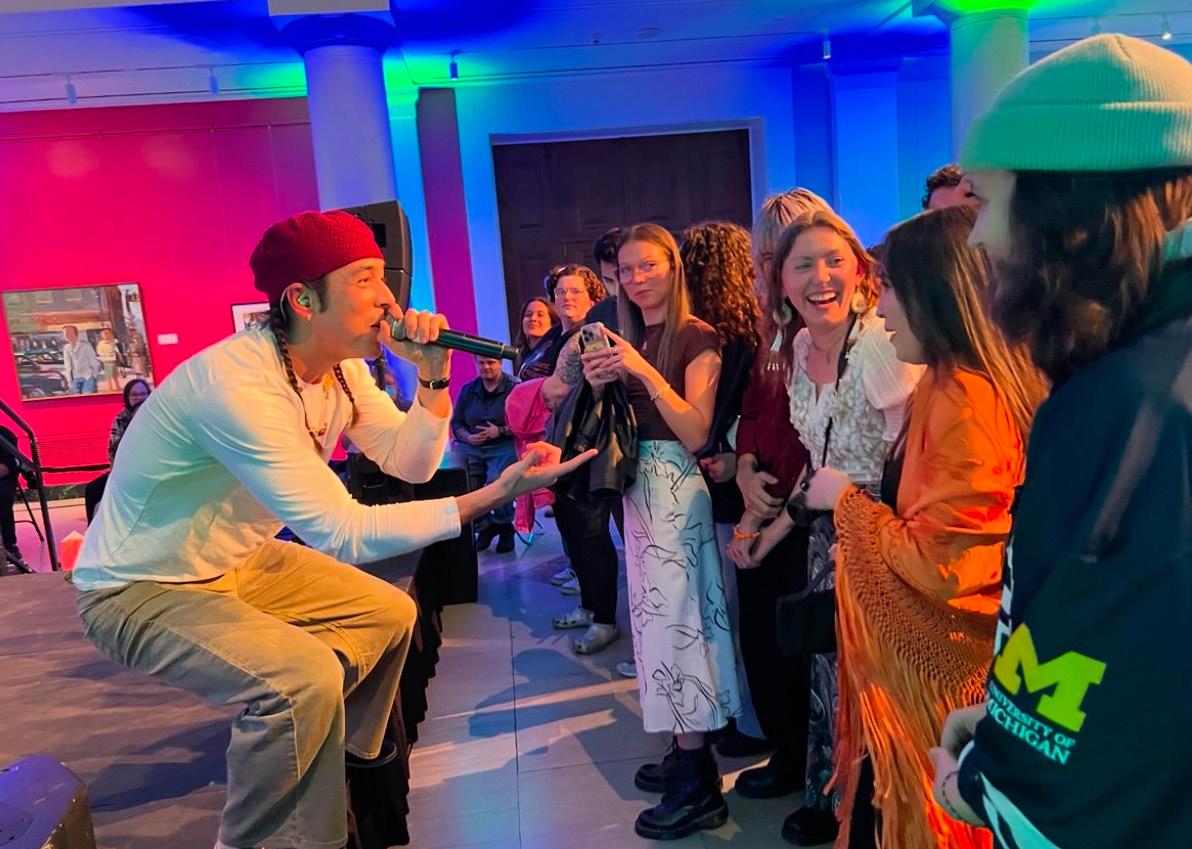
MESA facilitates five heritage months throughout the academic year:
• Latine Heritage Month
• Native American Heritage Month
• Black History Month
• Arab Heritage Month
• Asian American & Pacific Islander Heritage Month

Each month-long celebration offers intentional spaces for education, reflection, and critical dialogue. Through various events that serve as springboards for exploring cultural histories and contributions of diverse groups within the United States, they remain essential to our students’ holistic development and promote meaningful engagement for broader societal understanding.
104 heritage month events
41 sponsored events
4.5K attendees at MESA events
4 Student Life units involved
23 academic units involved
25 student orgs involved
Among MESA’s many collaborators throughout the year, the University of Michigan Museum of Art (UMMA) stands out as a key partner supporting both educational and cultural programming and helping amplify the voices of our vibrant communities far beyond the Ann Arbor campus.
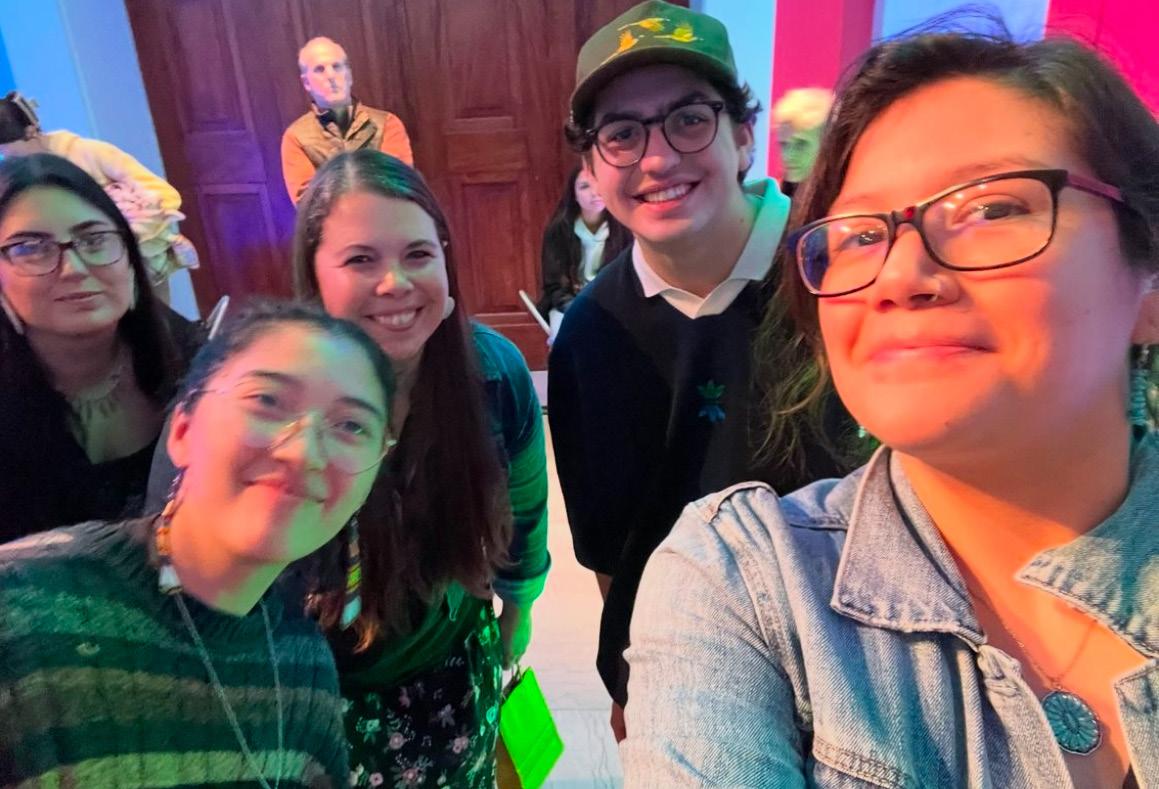
A shining example of this partnership is Feel Good Frybread, an annual event held in conjunction with Native American Heritage Month each November. Cocreated with student leaders and campus partners, the event centers Native joy, culture, and contemporary expression.
LSA junior and NASA co-chair Noemi Tehauno shared with The Michigan Daily what Feel Good Frybread means to them and the broader community:
“I feel like in the public eye, Native people aren’t viewed as contemporary, so I think events like this are really important.”
NOEMI TEHAUNO, LSA JUNIOR
This year’s event featured a free live performance by Mato Wayuhi (Oglala Lakota), acclaimed composer for the awardwinning FX/Hulu series Reservation Dogs. The program also included screenings of Living in Balance: Anishinaabe Star Knowledge, fresh frybread by Eva and Robin Menefee of Anishnabe Meejim, book giveaways, and hands-on art activities. Together, these elements created an inclusive, celebratory space that brought together hundreds of students and community members to honor Native creativity, culture, and resilience.

Sanda Cisneros
Through the power of collaboration between Rackham Graduate School, OAMI, American Culture Studies, the Department of English Language and Literature, the Opportunity Hub, and MESA, the University of Michigan hosted acclaimed author Sandra Cisneros at Rackham Auditorium.
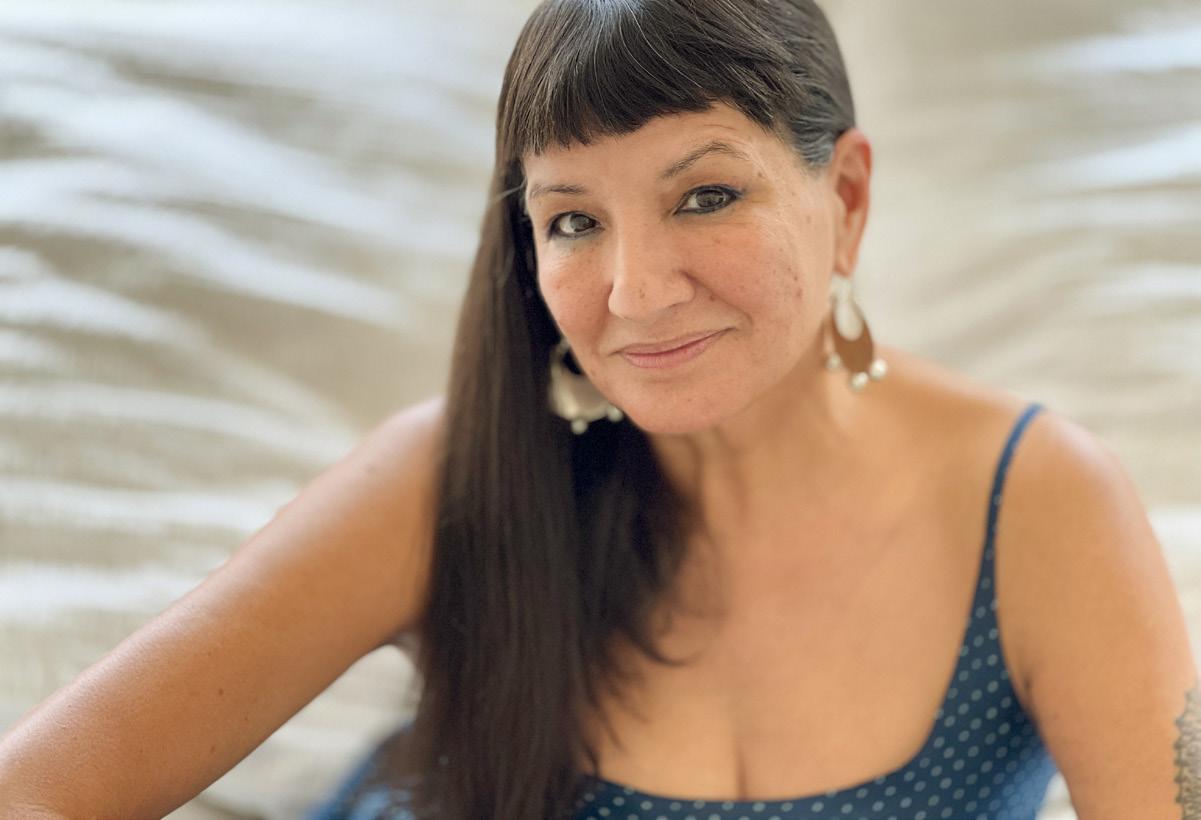
Best known for her groundbreaking novel
The House on Mango Street, Cisneros engaged in a heartfelt and thoughtprovoking conversation with her longtime friend, U-M anthropology professor Ruth Behar. The event drew hundreds of students, faculty, staff, and community members, all eager to hear from one of the most influential voices in contemporary American literature.
The House on Mango Street tells the story of Esperanza Cordero, a young Latina girl navigating life, identity, and belonging in the Hispanic quarter of Chicago. Interwoven with poetic vignettes and rich cultural detail, the novel captures the universal longing for home, acceptance, and selfdiscovery. For many Latina readers, it remains a deeply personal and resonant coming-of-age narrative.
With over 7 million copies sold and translations into 25 languages, the novel continues to impact generations. However, it has recently faced book bans in several Rio Grande Valley school districts in Texas. In response, Cisneros offered a powerful defense of literature’s role in shaping lives:
“You don’t want your child to read this book; I understand that. But somebody else’s child might need to read that book because books are medicine. Just because one book isn’t your prescription doesn’t mean you should burn down the pharmacy.”
The evening was a celebration not only of literature but of the power of storytelling to challenge, heal, and connect us all.
As part of this year’s Black History Month celebrations, and in alignment with the theme “It Starts with Us: Embracing Our Collective Power,” MESA co-hosted “Uplift & Unite: Exploring Black History Through Campus Activism.” This powerful program was made possible through collaboration with the Black Student Union, Bentley Historical Library, Department of Afroamerican and African Studies, Shapiro Library, Support for Incoming Black Students (SIBS), and the Trotter Multicultural Center.

Uplift & Unite stood at the intersection of archival scholarship, student activism, leadership, and deep reflection. The program featured a gallery-style exhibit that offered an in-depth look at historical artifacts from the Black Action Movement
and the “Being Black at U-M” social media campaign. Hundreds of community members visited the exhibit, engaging with decades of student-led efforts that shaped the university’s culture and policies.
Complementing the exhibit was a moderated panel discussion featuring living historians and key participants from these pivotal movements. Nearly 100 students, faculty, staff, and community members attended the event, participating in meaningful dialogue that deepened their understanding of the university’s legacy of Black student activism.
The evening not only honored the power of community organizing, but also underscored the ongoing importance of Black History Month as a time to reflect, learn, and unite around shared commitments to build a better and healthier society.
As part of our Asian American and Pacific Islander Heritage Month programming, one of the featured intersectional events centered around the theme “Woven: Our Common Threads,” a call to reflect on the shared memories, struggles, and histories of resistance and resilience that unite the AA&PI diaspora.
We were honored to welcome Curtis Chin, University of Michigan alum and author of
the acclaimed memoir Everything I Learned, I Learned in a Chinese Restaurant. Speaking to a packed room of students, Chin shared powerful reflections from his life and writing.

Born and raised in Detroit, Chin recounted his family’s move to the suburbs of Troy, where he was one of the few Asian American students in his school. His family’s business, Chung’s Cantonese Restaurant, became not just a livelihood but a cornerstone of identity, memory, and community. From the booths of that dining room, Chin observed the world, weaving personal stories with historical context to illuminate themes such as multigenerational Asian American households, the complexities of family-run businesses, late-20th-century Detroit, and his journey of coming of age as a queer Chinese American boy.
His storytelling captured the spirit of “Woven: Our Common Threads,” offering students a nuanced lens on identity, belonging, and layers of AA&PI experience.
This year’s Arab Heritage Month theme, جذورنا (Juthooruna), Our Roots, honored both connection and the enduring pride in a shared culture even in the face of distance and displacement. The theme reflected the essence of diasporic identity: a blend of tradition and lived experience, resilience and adaptation; all grounded in a deep connection to heritage.
Sofra Night beautifully brought this theme to life. The campus community gathered for an evening that radiated the warmth of Arab hospitality, featuring traditional floor seating, vibrant conversation, and a delicious Arab-style dinner. The atmosphere was further enriched by live music, authentic flavors, and meaningful connections, creating a space where students, faculty, and staff could convene to celebrate culture, memory, and belonging.

Each year during graduation season, MESA proudly celebrates students who have served in various roles within our programs throughout their undergraduate journey. These students have contributed as peer facilitators, program coordinators, and student leaders, each playing a vital role in advancing our mission. This year, we honor 38 graduating student staff and MESA leaders, and we are excited to witness all they will accomplish in the next chapter of their academic and professional lives. We are deeply proud of their growth, leadership, and lasting impact on our community.
“Shout out to MESA for being there for the community when no one else was!”
MESA LOVE ATTENDEE
“MESA is Love! MESA is Life!”
MESA LOVE ATTENDEE
“Shout out to MESA staff for being the best!”
MESA LOVE ATTENDEE




MESA embeds meaningful learning opportunities throughout our themes of celebration, education, and social capital. Through intentional educational engagement, we aim to deepen students’ understanding of identity and its impact on self, others, and community. Grounded in a transformative learning framework and viewed through the lens of race and ethnicity, we help students grow the knowledge and skills needed to navigate diverse environments and foster inclusive communities.

The Anti-Racism and Coalition Building Teach-In remains a cornerstone of our educational efforts. This peer-led program is facilitated by members of the Peer Inclusive Education (PIE) team, who use dialogic pedagogy to guide their peers through critical conversations about race, identity, and systemic inequality.
Through interactive, reflective, and analytical frameworks, the teach-ins explore how cultural, social, economic, and political forces shape communities.
In 2024–2025, the PIE team facilitated 41 teach-ins, engaging 1,143 participants, the majority of whom were students. Qualitative feedback from participants indicates a stronger understanding of how multiple social identities, not only race, shape knowledge. Many students also expressed a commitment to continued learning and active engagement with the complex social issues that affect themselves, their peers, and the wider community.
231 participants provided feedback on their experiences and learning with the Anti-Racism Teach-In.
98% 94% 95% 97%
agreed that they “understand the difference between non-racism and anti-racism.”
agreed that attending “has helped me to recognize how racism has been internalized in my daily life.”
felt their “organization is better prepared to apply the strategies discussed in their workshop”
felt their “organization benefited from the dialogues throughout the workshop”
41 teach-ins delivered
1.1K attendees total
“I felt like it was a really safe space to talk to my peers about topics I usually don’t feel comfortable bringing up!”
“I appreciated the opportunity to have a meaningful conversation about race and identity. These conversations often bring discomfort, but the workshop was led so well that I could feel uncomfortable without feeling intimidated by the topic.”
FIRST-YEAR
“This workshop is excellent, and I really wish we had something like this when I was in college. Thank you!”
STAFF
“Holding space to talk about racist messages we received and internalized growing up was a great opportunity to be vulnerable and learn how each person has been impacted by racism in different ways.”
SENIOR
“[This workshop] was great! I think now our organization will bond better and create stronger relationships, especially given the current climate of [our organization].”
JUNIOR
Student-led conferences remain a cornerstone of MESA’s approach to fostering meaningful learning experiences. These conferences empower students to take ownership of their education by advocating for their learning and addressing issues important to them. The conferences also provide vital opportunities for students to prepare, reflect on, and share evidence of their growth through participation in workshops, dialogues, and community-building activities.
At the heart of MESA’s mission is the belief that every student should be a lifelong, active participant in their education, grounded in a strong sense of self and community, rather than a passive consumer of information. Student-led conferences are essential to realizing this mission, particularly through the lens of race and ethnicity.
3 student-led conferences
473 attendees total

MESA proudly sponsored the 22nd Annual VIA-1 (Vietnamese Interacting as One) Conference, hosted by the University of Michigan’s Vietnamese Student Association from February 28 to March 2, 2025. As the only Vietnamese American regional conference in the Midwest, VIA-1 aims to foster cultural heritage and redefine identity through meaningful workshops and activities.
This year’s theme, “Memories of Home: Ký ức quê nhà,” provided a platform for Vietnamese American college students across the Midwest to come together, celebrate their roots, and engage in dialogue about identity and community. We commend the dedication and hard work of our student organizers and leaders for successfully coordinating this impactful, large-scale event.
297 attendees AT VIA-1
A MESA-sponsored event led by UAAO, the High School Conference (HSC) is a free, one-day event held on campus to support high school students in exploring
and affirming their identities, inspiring leadership, and providing insights into college life.

This year’s theme, “Choose Your Own Adventure,” encouraged students to embrace their unique paths as they transition into new phases of life. Through interactive workshops and activities, student leaders guided attendees in exploring their identities and possible career directions. The theme, inspired by retro video games, evoked nostalgia and a sense of belonging, encouraging students to carry their cultural heritage forward as they navigate their futures.
The high school conference welcomed 97 attendees (of 133 registrations), with 14 small group leaders, 30 performers, and five workshops.
97 attendees AT HSC
Inspired by Tongan scholar Epeli Hau‘ofa’s seminal work “Our Sea of Islands,” the University of Michigan’s Oceania Student Association hosted its second annual TASI Conference, designed to unite Pacific Islander students and community members across the Midwest.
Tasi means “one” in Samoan and “ocean” in CHamoru, a powerful metaphor for the shared experiences of Pacific Islanders living far from their homelands. This year’s theme, “LUA: Listening to Unheard Ancestors,” invited participants to reflect deeply through workshops, lectures, and
cultural performances held at the University of Michigan Museum of Art.
The conference included workshops focused on movement, creative expression, community building, and wellness.
TASI brought together 83 students and community members for a collection of three workshops, a keynote, tradional performances, and a cultural excursion.

Building social capital is essential for student success. Beyond the traditional mix of hard and soft skills, social capital encompasses a complex web of supportive networks, access to vital information, and intentional guidance for realistic goal-setting. These elements foster a deeper sense of agency and social connections as students navigate college and prepare for life beyond.
MESA’s grants, welcome programs, and mentoring initiatives create opportunities that enhance social and academic engagement. By focusing on agency and connection building, these programs empower students to continue achieving their goals and making meaningful contributions throughout their college experience.

138 participants provided feedback on their experiences at MESA’s welcome programs in fall 2024. 96% 90% 92% 93%
reported that they have learned something valuable during the program
reported that the program helped foster the community
reported that they felt stronger sense of belonging
reported that they felt connected to the campus after the program
239 welcome prog. attendees 2024-25
64 volunteer engagements 30%

ALMA is a collaboration between MESA and La Casa, and is open to all incoming and transfer students interested in exploring the Latinx experience on campus. This immersive four-day program offers community-building activities (rope course), resource scavenger hunts, discussion panels, and workshops. Participants engage in meaningful discussion and dialogue around campus involvement, building a support network, personal and social identities, and reflecting deeply on topics related to the Latinx community.
• 60 participants completed the four day program
• 7 core members
• 33 volunteers

SALAM is a collaboration between MESA and the Arab Student Association. This three-day experience is open to all incoming first-year and transfer students interested in exploring the experiences of Arab students and engaging with the broader community.
Throughout the program, participants learn about campus resources and build connections that foster a strong sense of community and belonging.
• 105 participants completed the three-day program
• 12 core members
• 18 volunteers

GOAAL is led by five core members from the United Asian American Organizations (UAAO) and the Oceanic Student Association (OSA). Modeled after ALMA and SALAM, this two-day cohort-based program welcomed incoming first-year and transfer students interested in learning about the Asian American and Pacific Islander (AA&PI) community and experiences at the University of Michigan.
Participants engaged in identity exploration and leadership workshops, attended a student leader panel, and took part in presentations by UAAO and OSA, as well as an AA&PI Student Organization Fair. A key focus of the program was fostering social connections, both within the cohort and between participants and upper-level student leaders.
• 14 participants attended
• 5 core members
• 5 volunteers
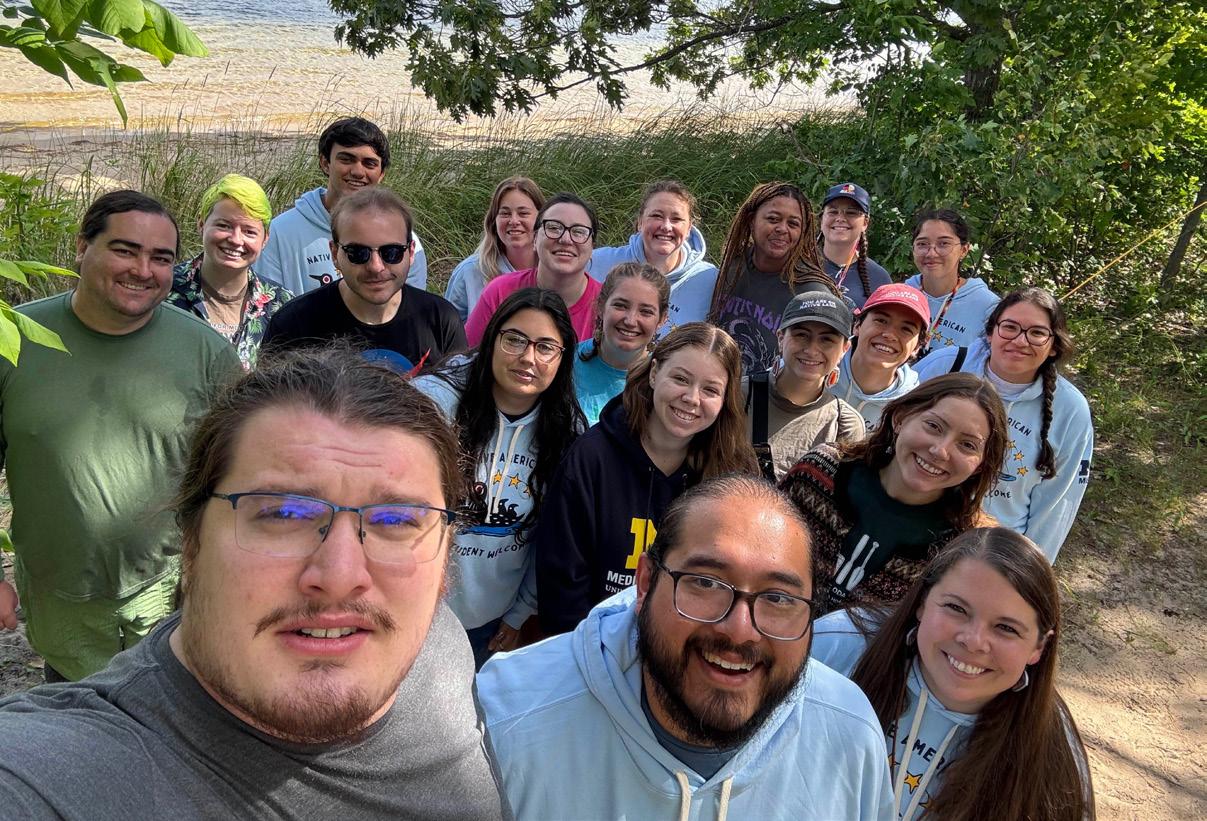
The Native American Student Welcome is an inclusive program designed for incoming first-year and transfer students who are interested in connecting with Native American students, faculty, staff, and communities at the University of Michigan. In partnership with the Native American Student Association, the program provides opportunities to build community, learn about campus resources, and engage more deeply with Native identity and culture.
Students traveled to U-M’s Biological Station to spend time in Waganakising (Little Traverse Bay area), before being welcomed to campus to continue their social connection and engagement in cocurricular experiences.
• 26 participants attended
• 4 core members
• 12 volunteers
• 67 community members
Supporting Incoming Black Students (SIBS) is the only mentorship program at the University of Michigan with a primary focus on social, cultural, and community building. MESA believes that fostering a strong sense of belonging and connection is essential to students’ academic success, retention, and overall well-being.
The SIBS program has experienced steady growth over the past five years, with continued improvements in structure and organization. Through intentional programming and peer mentorship, it provides incoming students with meaningful support as they transition into university life.

24 events hosted
92 Big SIBS UPPER YEARS
74 Little SIBS FIRST YEARS
From our participants—What does it look like to live out what you have learned from experiencing this event/ program?
“When I met my Big SIB, I felt right at home. SIBS made me feel like I truly belong here at U-M. It’s a big reason I came back for my sophomore year—and why I’ll be a Big SIB next year as a junior.”
RISING JUNIOR
“I learned about SIBS during my junior year because I wanted to help my younger classmates find their way at Michigan. I didn’t realize I’d also meet some of my best friends in the process.”
RISING SENIOR
“This organization means so much to me. I’ve met so many amazing people, learned about their backgrounds, and played a part in creating and sustaining a strong, supportive community. SIBS is an org I’m proud to be part of. I’m especially grateful for our advisor, who truly listens to our needs and encourages us to try new things.”
RISING SENIOR
“SIBS is so fun! I’ve had the chance to study, have meaningful conversations, and explore outside of Ann Arbor with my Big SIB and this group that’s become my friends. It means a lot to have people who can show me new things—and even help with professional development... I can’t wait to see what we do next year!”
RISING SOPHOMORE

Funding student organizations to execute their ideas is enormously impactful for fostering a well-rounded and enriching college experience.
These organizations, through their activities, promote a sense of community, cultivate leadership skills, and provide rich opportunities for personal and professional development. They also create spaces for students to explore diverse interests and contribute to the university’s vibrant social and intellectual landscape.
Required pre- and post-advising meetings make MESA’s grants program especially unique. Each grant awardee meets with a MESA advisor to walk through their project planning during the pre-
advising session and to discuss lessons learned and key reflections during the post-advising session. This structure embeds an intentional process of inquiry, learning, growth, and reflection into the grant experience, reinforcing MESA’s commitment to student development and empowering engagement.
21K grant event interactions
62%
“I learned a lot of really useful tips on applying for MESA grants, such as being very specific about things like intended audience and purposes of all spending decisions.”
JORDANIAN STUDENT ASSOCIATION
“One thing I learnt was the interesting ways that other organizations do their programming.”
AFRICAN STUDENT ASSOCIATION
“Failures are part of the event process. They’re lessons that help us do better in the future.”
MICHIGAN MALAYSIAN STUDENT ASSOCIATION
152
136 grants awarded 21%
250 advising sessions 20%

A number of student organizations are sponsored by or maintain a close advisory relationship with MESA. Through these relationships, MESA provides comprehensive advising and coaching to student leaders, helping them navigate university procedures, manage budgets, and understand institutional policies related to liability and risk management.
• Black Student Union
• La Casa
• Native American Student Association
• Supporting Incoming Black Students
• South Asian Awareness Network
• Oceanic Student Organization
• Mixed at Michigan
• Caribbean Student Association
• United Asian American Organizations
• High School Conference
• Arab Student Association

Oceanic Student Association
OSA was honored with the Student Organization of the Year Award
Caribbean Student Association
This year, CSA launched its first-ever CSA Week (April 7–17), a dynamic, cross-collaborative celebration.




A total of 514 students responded to our program evaluation survey. The data highlights a strong, positive impact across multiple key dimensions, including sense of belonging, identity awareness, leadership development, community connection, and knowledge transfer.
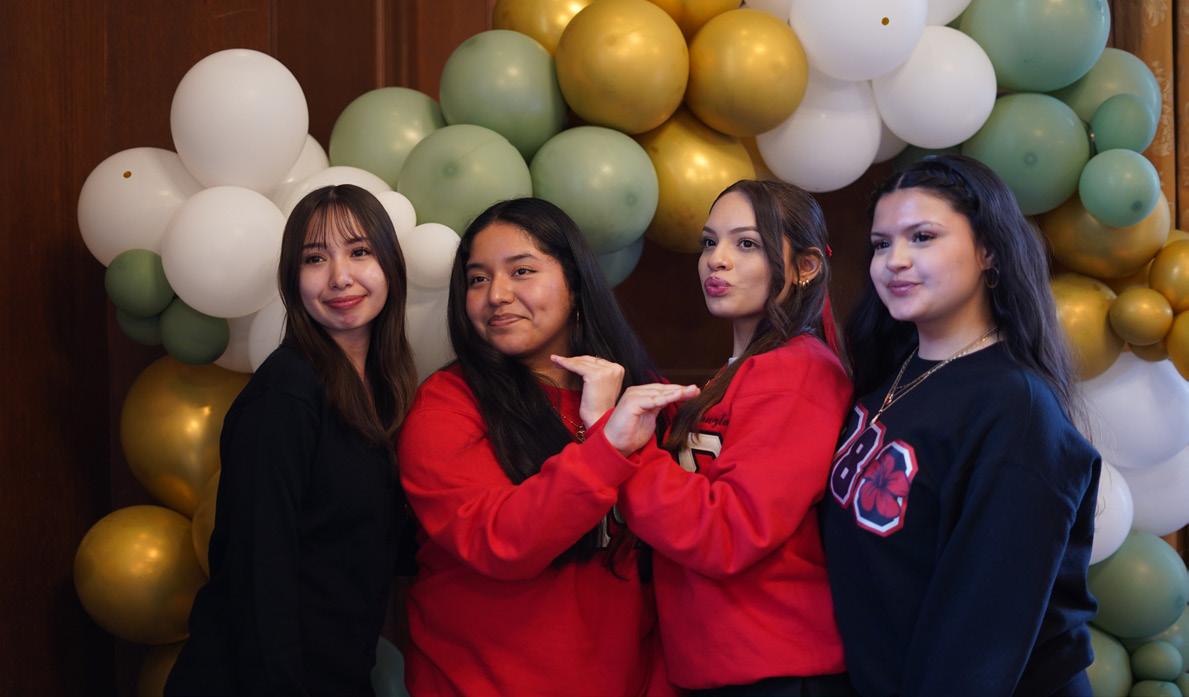

91% reported that the event/ program enhances their civic and community engagement. 92% reported that the event/ program makes them feel a sense of community on campus. 85% reported that they received information/knowledge from attending the event/program that can be applied in their academic experiences.
n=388

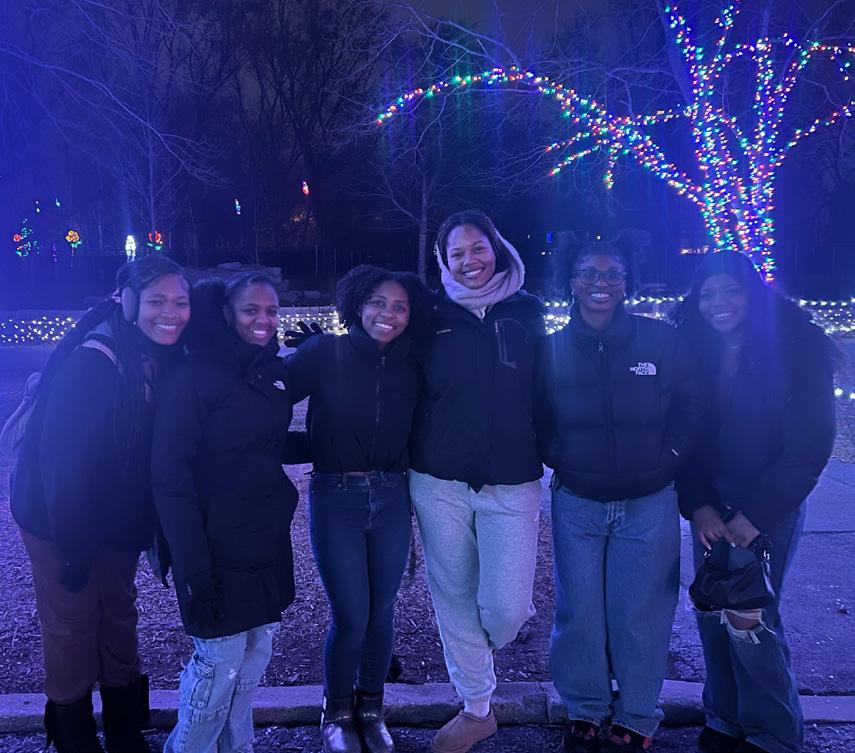

Some highlighted anonymous reflections when asked “What does it look like to live out what you have learned from experiencing your MESA welcome program?”
“Helping others in the community as we can and acknowledging that everyone belongs.”
“I feel less antisocial when talking to new people.”
“It’s
amazing to connect and learn.”
“Being able to forge connections with people in class or the workplace, feeling proud of my culture wherever I am.”
“I feel more confident in myself.”
“I learned how to get around campus and made many connections… I now have people I can reach out to if I ever need help. Thanks to Salam.”
“The support I have gained from the connections I made has made me feel more prepared and confident in tackling my first semester.”
Andrea Wilkerson
Received U-M’s Distinguished Diversity Leaders Award in recognition of her outstanding dedication to diversity at the university and her service to Native students
Campus looks to MESA’s newsletter, social media, and website for ways to get involved in our programs and celebrate heritage months at U-M.

72% avg. newsletter open rate 5 PCT PTS
2.2K followers on Instagram 18%
Nadia Bazzy
Teaching Introduction to Doctoral Studies at NYU Steinhardt EdD program in Leadership and Innovation
• The bi-weekly MESA Notes ran for 17 editions this year. The list is healthier than ever, growing subscribers 33% and improving performance.
• Interest in heritage month calendars, grants, mentorship, and workshops drew thousands of views and clicks to our publicfacing website.
• Through collaborations and thoughtful content, our Instagram reached more students than prior years, growing to over 2,200 followers.
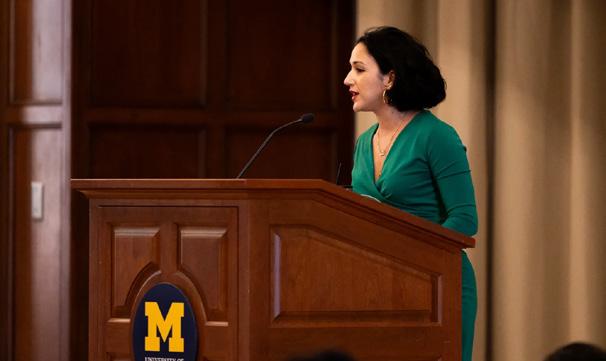





MESA hosts Latine Heritage Month opening ceremony by Audrey Shabelski
September 18, 2024 | The Michigan Daily
UMich hosts conversation with ‘The House on Mango Street’ author by Patricia Leoncio
October 21, 2024 | The Michigan Daily
La Unión cultural fair spotlights
Latine students by Thomas Gala-Garza
October 26, 2024 | The Michigan Daily
UMMA celebrates Native American Heritage Month with ‘Feel Good Frybread’ by Kaelyn Sourya
November 17, 2024 | The Michigan Daily
UMich celebrates 2025 Black History Month with opening ceremony by Grace Schuur
February 3, 2025 | The Michigan Daily
Ann Arbor celebrates annual Japanese Culture Festival by Dominic Apap
April 7, 2025 | The Michigan Daily
This year, we said farewell to Ruby Flores-Camacho and welcomed Amin Saleh to the MESA team.

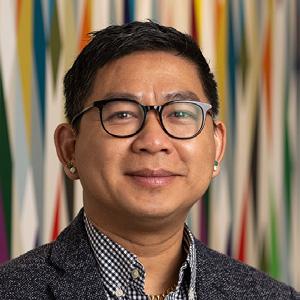




Dr. Nadia Bazzy
she/her
Director
Dr. Krishna Han
he/him
Associate Director
Andrea Wilkerson
she/her
Assistant Director
Jamie Carter
she/her
Program Manager
Ruby Flores Camacho*
she/her
Program Manager




Nick Pfost
he/they
Communications Strategist
Amin Saleh
he/him
Program Manager
Irma Shepard
she/her
Office Assistant
Pa Houa Xiong
she/they
Program Manager